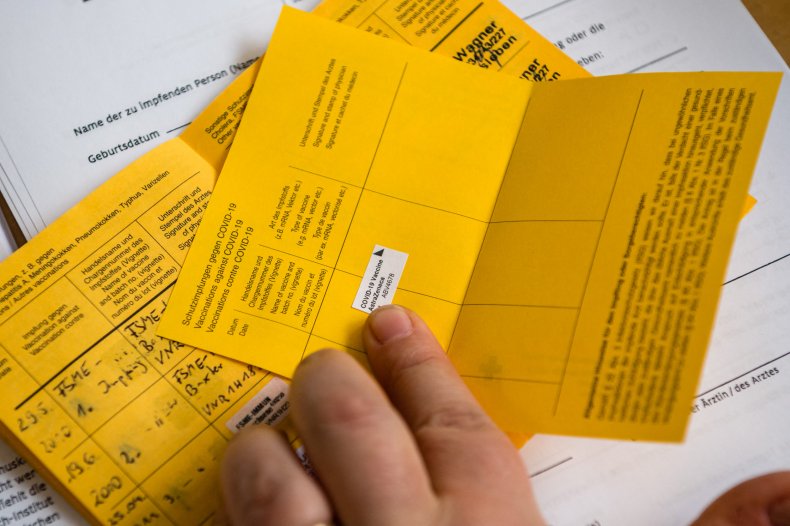Vaccine Passports Brouhaha Puzzles International Travelers Who've Needed Them for Years
The latest buzz over the implementation of COVID-19 vaccine passports is puzzling some international travelers who have had to carry similar vaccination cards for decades.
According to the World Health Organization, international travelers visiting certain high-risk countries have to prove that they have been inoculated against infectious diseases such as yellow fever, rubella, cholera and poliovirus for years.
After being vaccinated, travelers often receive a signed and stamped "yellow card," known as an International Certificate of Vaccination or Prophylaxis, to prove they have been vaccinated.
But now, as some countries are in the middle of developing protocols for COVID-19 vaccine travel requirements, people are confused by a lack of support for an idea that has already been a regular part of travel for decades.
"Are people against vaccine passports for international travel or is it just about domestic stuff? Because I've had to carry proof of a yellow fever vaccination for years in order to travel through most of Africa so this is nothing new," journalist Yashar Ali tweeted Tuesday.
Along with his statement, Ali also shared an image of an international vaccination certificate signaling that he has been inoculated against yellow fever.
Are people against vaccine passports for international travel or is it just about domestic stuff?
— Yashar Ali 🐘 (@yashar) March 30, 2021
Because I’ve had to carry proof of a yellow fever vaccination for years in order to travel through most of Africa so this is nothing new.
It looks like this... pic.twitter.com/Tsgiq0ecTu
In response, Twitter user Remy Bergsma wrote: "Yeah, it's very common here in The Netherlands too, nicknamed 'the yellow book'. Surprised so many ppl (here in NL) have never heard of it."
It looks like this: pic.twitter.com/r9MYx8FaK1
— Remy Bergsma (@remybergsma) March 30, 2021
In an op-ed written in The Guardian in February, David Boswell of Oxford pointed out that he still has vaccination stamped and dated for certain inoculations from over 70 years ago.
"I still have the stamped and dated certificates for smallpox and yellow fever that were required for travel to Zambia, Egypt etc, in the 1950s and 60s," Boswell wrote.
Proof of inoculation against certain diseases to travel is not a new concept. Now, nations such as Denmark, Japan, Israel and Greece have already laid out plans to make both domestic and international travel easier with the use of a coronavirus "vaccine passport."
The U.S. currently has no vaccination requirements for either international visitors or domestic travel, but President Joe Biden has indicated support for the development of a coronavirus vaccine card.

In January, Biden issued an executive order directing agencies to assess the feasibility of linking COVID-19 vaccinations to vaccine cards.
But on Monday, White House coronavirus adviser Andy Slavitt said that the government would not be the one to issue the vaccine credentials, or store citizens' vaccination information in a database.
"Unlike other parts of the world, the government here is not viewing its role as the place to create a passport, nor a place to hold the data of—of citizens. We view this as something that the private sector is doing and will do. What's important to us, and we're leading an interagency process right now to go through these details, are that some important criteria be met with these credentials," Slavitt said.
When reached for further comment regarding Biden's stance on vaccine passports, a White House spokesperson pointed Newsweek toward additional statements by press secretary Jen Psaki on Monday.
"We expect, as Andy Slavitt I think alluded to, that a determination or development of a vaccine passport or whatever you want to call it will be driven by the private sector," Psaki said during a press briefing.
"Ours will more be focused on guidelines that can be used as a basis. There are a couple key principles that we are working from: One is that there will be no centralized, universal federal vaccinations database and no federal mandate requiring everyone to obtain a single vaccination credential; second, we want to encourage an open marketplace with a variety of private sector companies and nonprofit coalitions developing solutions; and third, we want to drive the market toward meeting public interest goals," she added.
Psaki did not provide a timeline for when the administration might issue such guidelines.
Nonetheless, some states have already pushed back against the concept of allowing a vaccine passport to be administered at all, even if it's done by a private sector.
Florida Governor Ron DeSantis said Monday he will be taking executive action very soon against "vaccine passports" over privacy concerns.
"It's completely unacceptable for either the government or the private sector to impose upon you the requirement that you show proof of vaccine to just simply be able to participate in normal society," he said.
But states and federal governments aren't the only ones interested in the new passports—airlines and other corporations have been pushing for the vaccine implementation, too.
More than two dozen groups wrote to White House Coronavirus Response Coordinator Jeff Zients this month, calling for the creation of temporary credentials that would let travelers show they have been tested and vaccinated.
The groups told the administration it was "crucial to establish uniform guidance" and that the U.S. "must be a leader in this development."

